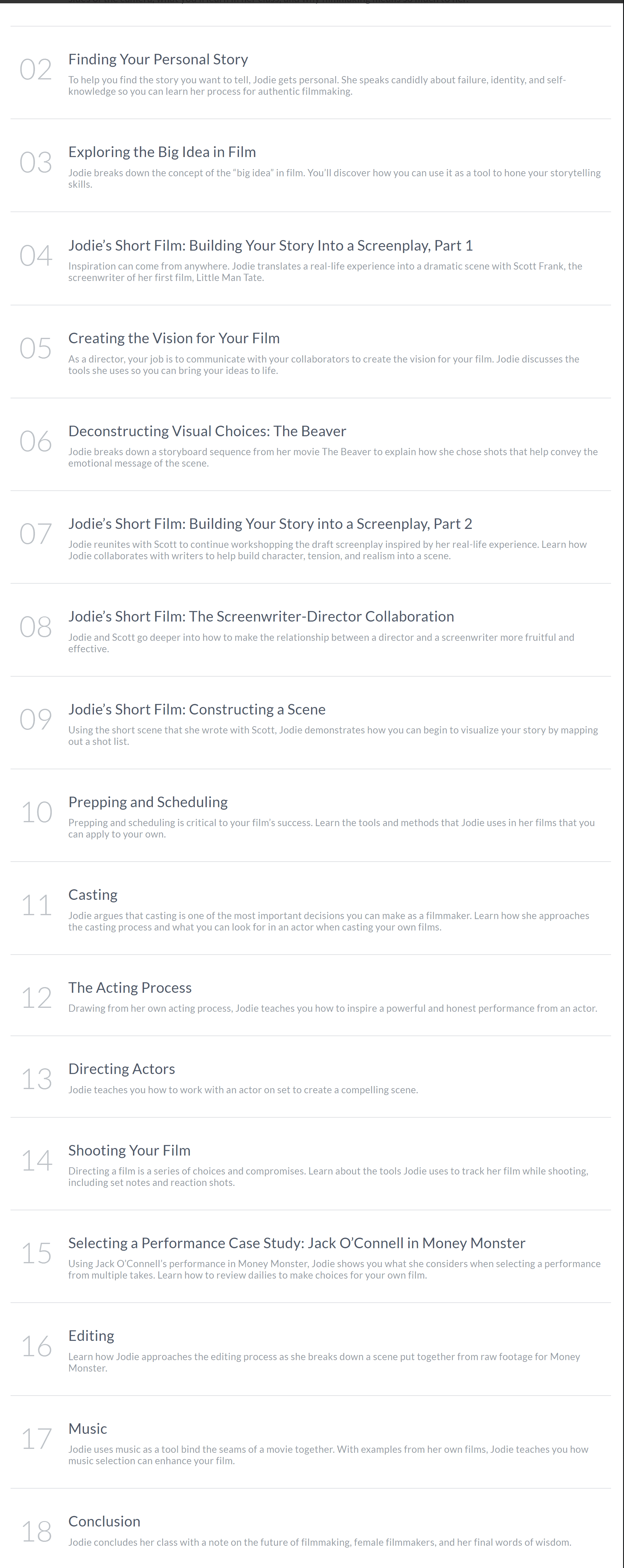Ever wondered what it’s like to learn filmmaking from a Hollywood legend? I recently tried Jodie Foster’s MasterClass to learn about filmmaking.
As someone who’s always been fascinated by movies but a bit clueless about the magic behind the scenes, this was a big step for me.
Jodie Foster, with her years of experience both in front of and behind the camera, seemed like the perfect teacher. I watched her classes from my home, hoping to learn cool movie stuff. In this review, I’ll tell you if her MasterClass is good and if you should try it, too.
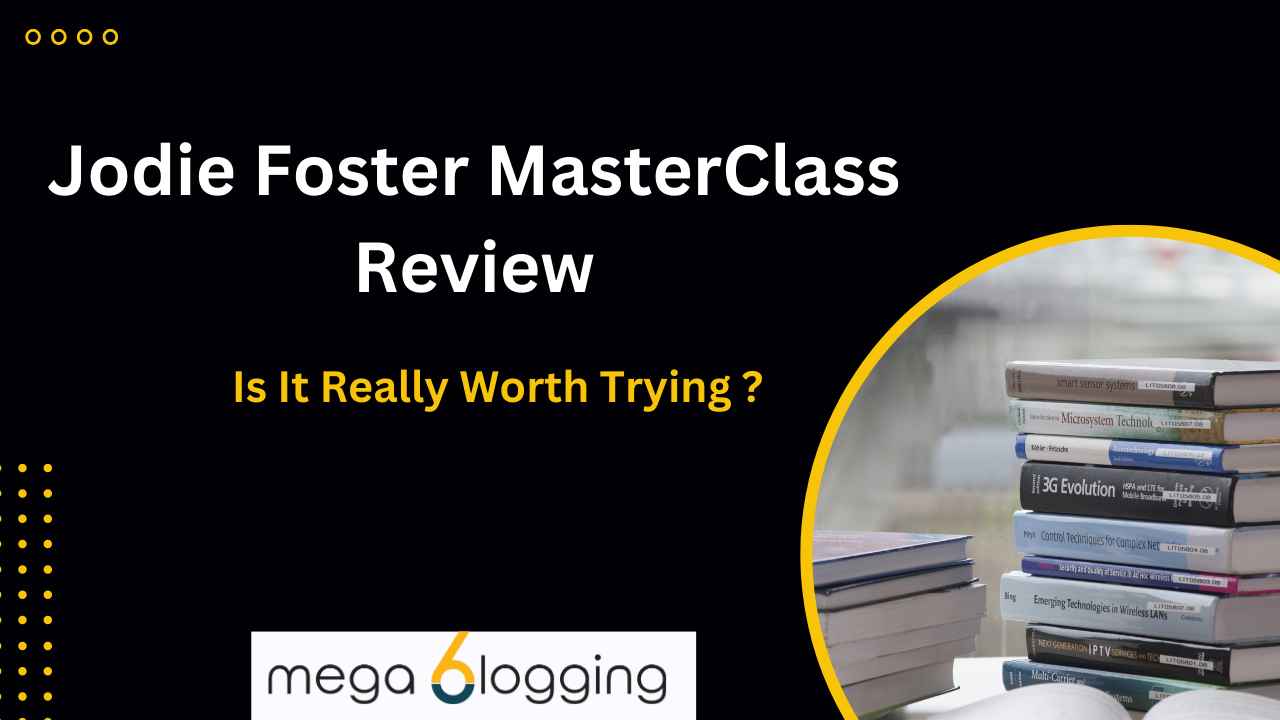
Table of Contents
Jodie Foster MasterClass Summary
| Aspect | Details |
|---|---|
| 🎓 Course Name | Jodie Foster MasterClass |
| 👩🏫 Instructor(s) | Jodie Foster |
| ⏱️ Class Length | 18 video lessons (4 hours 3 minutes) |
| 🎨 Category | Arts & Entertainment |
| 🎯 Who is this course for? | Suitable for anyone interested in filmmaking, from beginners to those with industry experience |
| ⭐ Rating | 9.2 out of 10 |
| 💰 Pricing | $90 for single access; $180 for an all-access package |
| 🌟 Overall Experience | Highly recommended for understanding filmmaking deeply; clear, inspiring, and practical lessons |
About Jodie Foster!
Jodie Foster is a big name in Hollywood. She’s won Academy Awards and is famous for acting in movies like ‘Taxi Driver‘, ‘The Accused‘, and ‘The Silence of the Lambs‘.
She’s not just a great actress but also a talented director and producer. Jodie really showed her skills when she played Sarah Tobias in ‘The Accused’ and FBI agent Clarice Starling in ‘The Silence of the Lambs‘. She won both an Academy Award and a Golden Globe for these roles.
After a lot of success in acting, she started directing movies and shows, showing her unique talents there, too.
Jodie Foster Masterclass Overview 2024
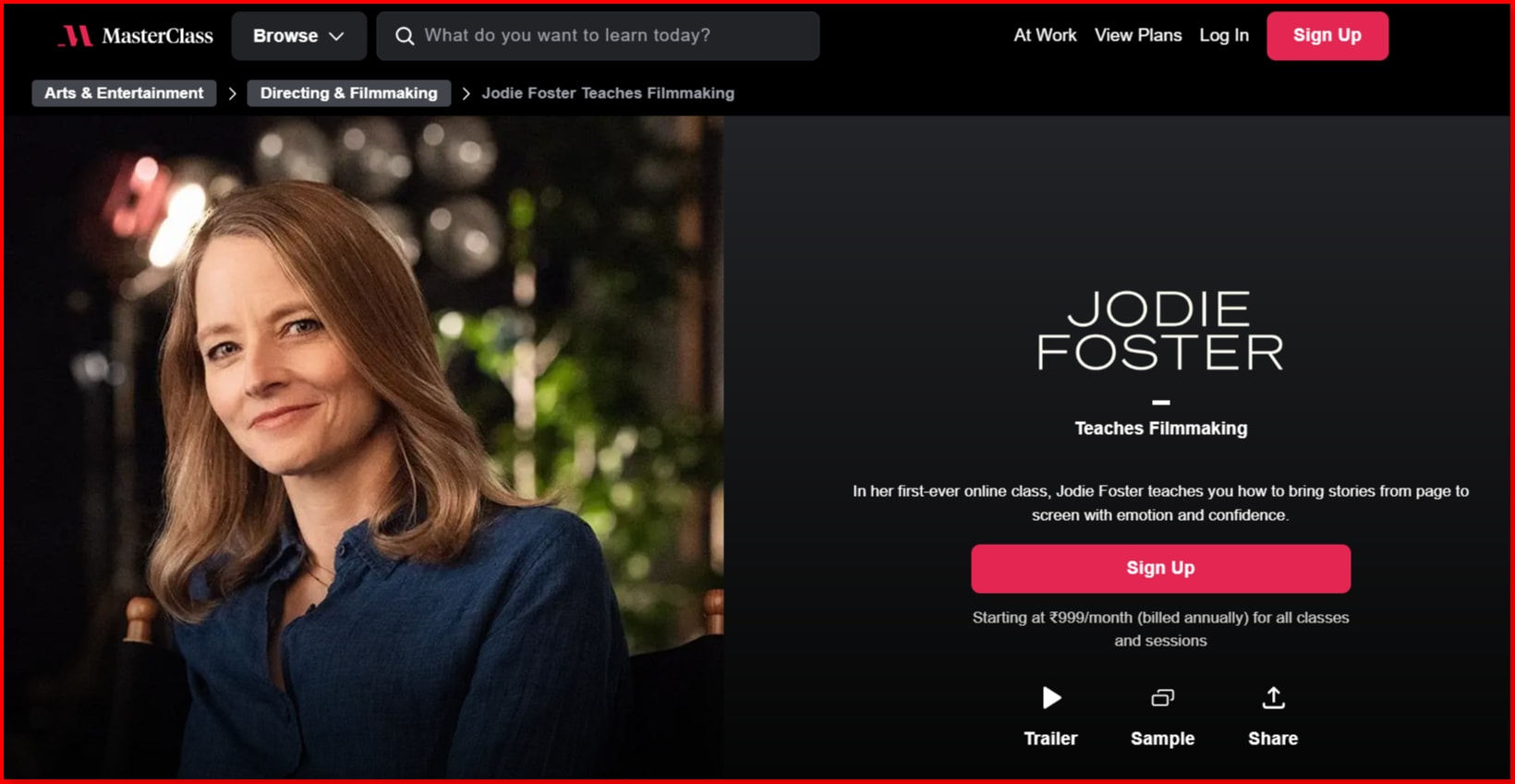
Her Masterclass has some really cool and interesting modules that will allow you to explore aspects of filmmaking that you won’t get to read or hear from on any other platform.
For example, Jodie shares different approaches to constructing a scene from what you’re probably used to.
Her different approaches to various professional aspects of filmmaking come from her background growing up in front of the camera.
Jodie Foster Masterclass Lesson Plan
The Masterclass courses are all well produced and presented.
There are fewer lessons in the Jodie Foster Masterclass (18) than in others.
However, they vary in length, with the more in-depth ones running up to 20 minutes, so the overall class time evens out.
- The exercises can take as much time as you’re willing to give them, but the more dedicated you will find it the most rewarding.
- The first few lessons in the Jodie Foster Masterclass cover the big picture of directing:
- Finding your personal story
- Exploring the big idea in the film
- Creating the vision for your film
The Jodie Foster Masterclass then takes a slightly more practical focus, tracking the development of a short film to show how a director works.
Jodie Foster explains how the inspiration for the idea came from her personal experience.
Several lessons then show the process of transforming this inspiration into an actual film.
Two lessons show how Jodie Foster workshops the script with a screenwriter, and further lessons show how she would prepare a shortlist, storyboard, and schedule.
The downside is that, after seeing all the preparation, we don’t see this short film actually being made. It would have been useful to see the same example used for lessons on casting, shooting, and editing.
The insight into collaboration, especially the relationship between writers and directors, is useful. However, following this project from script to screen could have also brought in cinematographers, actors, producers, editors, and so on.
She also backs up her advice with examples from the better-known films she’s acted in.
The role of a director on TV is often different from their role in the film. Jodie Foster has directed episodes of HOUSE OF CARDS, ORANGE IS THE NEW BLACK, and BLACK MIRROR.
A few behind-the-scenes images show her directing them, but it would have been interesting for the Jodie Foster Masterclass to touch on these experiences and how they differ from the film.
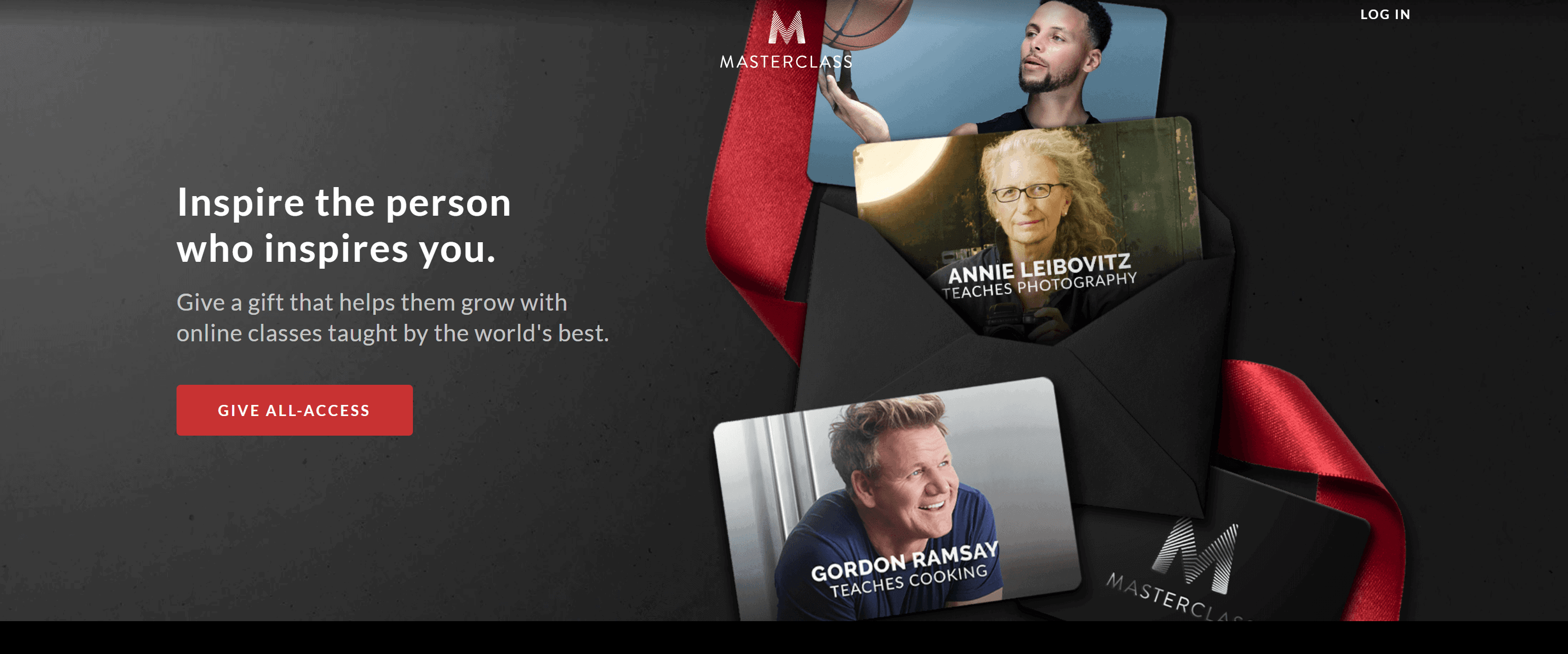
5 Highlight sections of Jodie’s filmmaking Masterclass!
Jodie Foster’s Masterclass is a really joyful experience for any person who has a passion for learning the art of professional filmmaking or for anyone who is simply an admirer of Foster.
Though I never considered filmmaking as my passion or hobby, the subject itself seems really enticing.
So, Jodie’s Masterclass was a great resource for me to explore how things are done behind the camera and what all goes into creating the perfect script!
Here are 5 important sections of Jodie’s filmmaking Masterclass that you should know about.
A fascinating insight into the world of filmmaking
I’m not a filmmaker, but I really enjoyed this course and was able to learn a few things.
It was highly entertaining and well-presented. Following the course was tricky in places, as Jodie Foster’s Masterclass’s key target audience is filmmaking students.
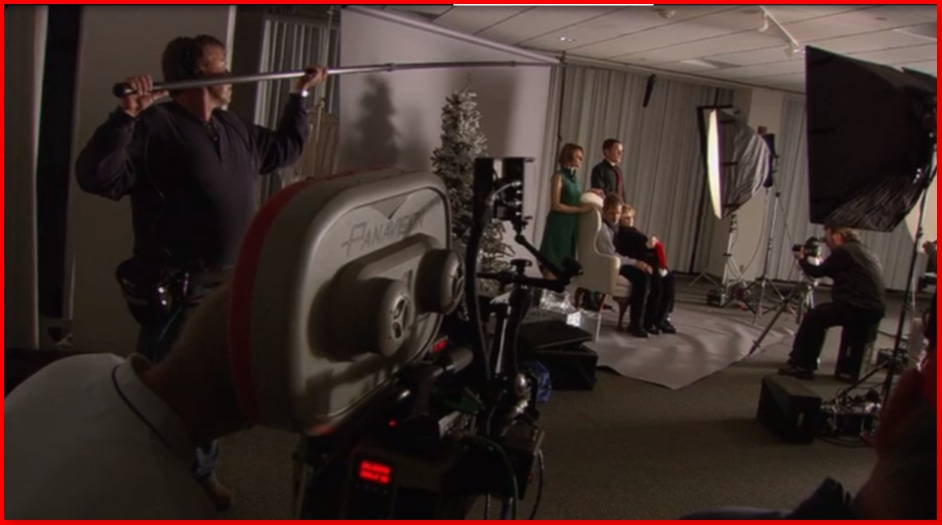
Yet I really believe most of you are going to find this course fascinating and insightful. She worked in the industry for 50 years, before and behind the camera.
She has been nominated for nearly 60 films and awards to direct during that time. Some of them winning.
Four of those nominations were for Oscars, and she won 2 of them. She does have plenty of experience, no doubt.
So, it’s a perfect Masterclass for you if you’re a filmmaker or just a film fan.
Finding your personal story
An idea comes up as the first step in making a film. Jodie Foster brings you to the cycle of seeking motivation very easily.
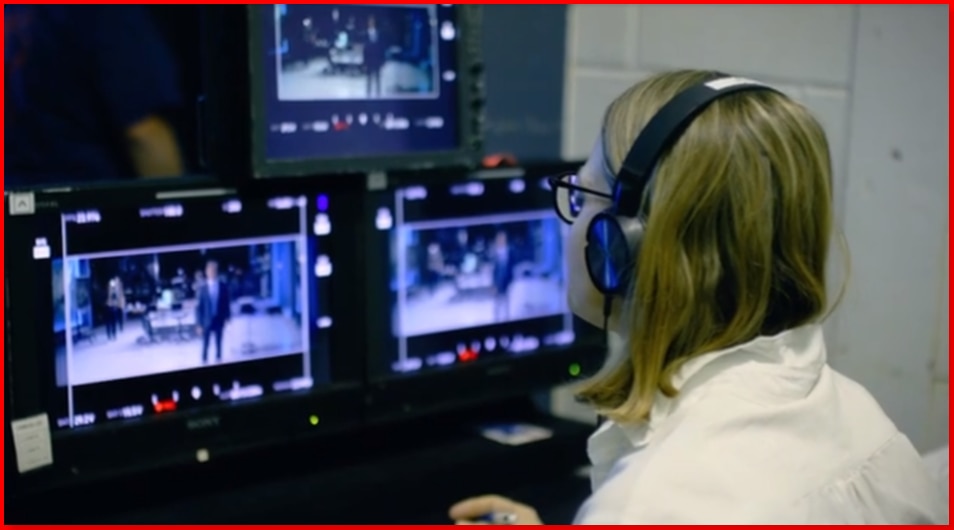
She does so by tapping into her own thoughts and experiences. Her suggestion is to give consideration to the following:
- Whatever inspires you
- Items that attract and catch your attention
- Things you feel excited about
- All that makes you crazy
You must believe in what you do and have an emotional connection to your film. If you do not, it would be hard to stand out from the crowd and get support.
Turning your story into a screenplay
I’ve done a lot of writing but never wrote a screenplay. So, I thought this portion of the course was particularly interesting.
The segment is a long one.
So, I recommend you set aside an hour or so to go through the material and do some of the exercises that the workbook contains.
Jodie can show you how the inspiration for stories and scenes will come from locations of all kinds. Many of her best ideas come from her own experience.
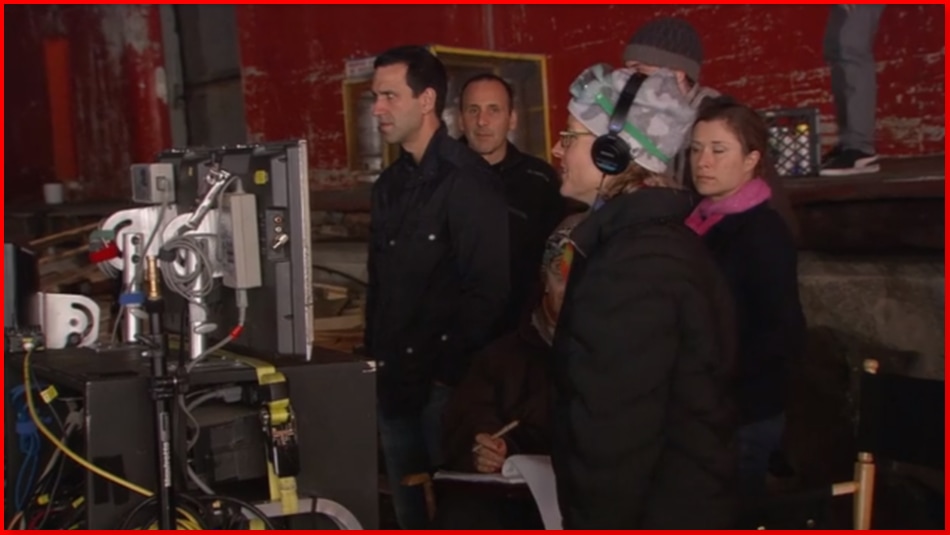
For this section of the course, I really liked the way Jodie drew on the screenwriter Scott Frank’s experience. In real time, she goes through a couple of ideas with him.
An approach that offers much more insight into the creative process than it would have been if she had kept talking to the camera.
She also shows the handwritten notes to the audience, which she has annotated and edited.
She gives you an insider’s view of the writing process in a way I’ve never seen done before.
No doubt, Jodie Foster is an excellent teacher. What surprised me most was how transparent Jodie Foster was. She is reputed to be quite a private citizen.
So, I didn’t expect her to let her students into the degree she does. You get to see the real Jodie Foster when you take this course.
At this point in the course, the workbook is invaluable in reinforcing your understanding.
This provides basic descriptions, some activities, and some additional resources to help you create your screenplay. Jodie’s character sketches made me smile, but I can see that it would be useful to use them.
Creating and communicating your vision
Having the movie look perfect is a big part of the creative process. Jodie isn’t going through as much depth as she did when she discussed how to write a screenplay. But she does provide a fairly long list of techniques that you can use to give the right look and feel to your film.
Take photos, for example, and print them out to help you and your team make things visual. Or explain the ambiance you’re trying to create for a scene instead of simply listing cold facts.
Again, she uses samples from her own films to illustrate every single point. That includes how she uses music to help her create her own vision.
Make sure you watch the 2nd video, too. Jodie takes a big scene from The Beaver in this episode and deconstructs it for you. It includes the sketched storyboard and descriptions of how Jodie would time the shots and movies to build the right suspense level.
It would be great to see one of the Masterclass moviemakers taking a full course on this aspect of filmmaking. I know what a storyboard is like most people but have no clear understanding of how to put one together.
So, I want to see that clarified in a lot more detail.
Director-actor relationship
Several key lessons specifically focus on the director-actor relationship:
- Casting
- The acting process
- Directing actors
- Performance case study
It’s in this area that the Jodie Foster Masterclass shines. Like other actors turned directors, Jodie Foster has decades of relevant experience behind her. She knows first-hand, what actors want to and needs to hear.
Her first piece of advice – that directors should try acting themselves – is spot on.
She also likens directing actors to parents. It might sound patronizing, but coming from an acclaimed, award-winning actress, one who’s directed George Clooney, Julia Roberts, Jennifer Lawrence, Robert Downey Jr., et al., it’s worth trusting her on this one.
Jodie Foster MasterClass Filmmaking – Who is it for?
This course is open to participation from anyone who would like to learn more about directing or filmmaking in general.
This class will teach you how to approach the process of filmmaking and how to interact with everyone involved, from actors to technicians.
It doesn’t matter if you have previous experience in the industry or if you are just starting out in the field; this class will teach you valuable insights that will help you.
She even puts some of the lessons into practice in order to show the audience how she creates a short video in her own unique manner by applying some of the techniques.
Through the process of collaborating with a screenplay, she demonstrates how to design a scene, how a great screenwriter-director relationship might function, and how to develop the story.
This session was quite interesting, and it provided a wealth of useful knowledge. Jodie Foster has developed a course that is not only packed with insightful information on the actor-director perspective but also encourages students to build their own directing signatures and find unique ways to express themselves as filmmakers.
If you are looking for a curriculum that will educate you on how to find your story and how to work along with everyone else involved in the filmmaking process, then this is the program that you should enroll in.
Jodie’s Masterclass Workbook
Jodie Foster Masterclass workbook is available to download in individual chapters, one for each lesson. It’s also available in one solid PDF document, which makes it a bit easier to navigate and go between lessons.
Exercises will often refer back to previous exercises, so it’s best to go in order.
The most interesting exercises revolve around creativity. In one lesson, Jodie Foster explains how she would have made the film THE MARTIAN personal to her – keeping the same premise but changing the tone and emphasis of the story.
This exercise is a great way to draw inspiration from films around you without being derivative, and important for working in the industry and being diplomatic about whether you like other people’s work!
As the Jodie Foster Masterclass goes on, the exercises focus more on how to apply what you’ve learned from studying other films to your own work.
Making that jump from theory into practice is a difficult one, and one inevitable downside of the masterclass format is that it’s entirely up to the class participant to carry it out.
Other resources in the Jodie Foster Masterclass relate to the short film that she works on.
Included are two versions of the script with Jodie Foster’s annotations, an example of a storyboard and floor plan for a scene, and an example of a schedule.
These extras really need to be consulted alongside their respective lessons in order to make sense.
Her storyboard, in particular, is hard to decipher without her accompanying explanations. (Again, this is part of the lesson: It doesn’t matter how well you can draw when creating storyboards just for your own use.)
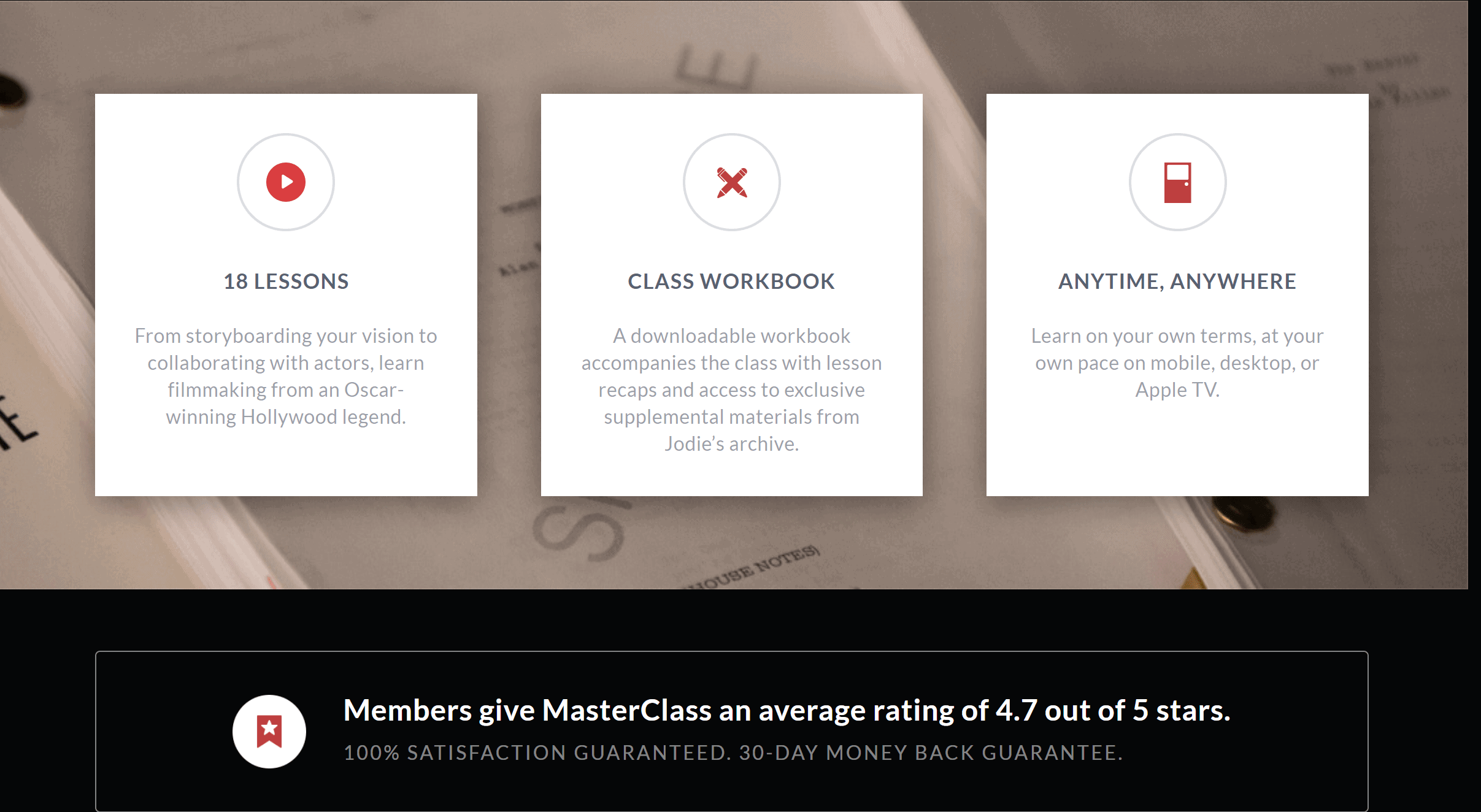
Masterclass Pricing Plans
There are two ways by which you can purchase a Masterclass: a single Masterclass and an All-Access Pass for any of the gurus on the platform.
- Single Masterclass: $90
- All-Access Pass: $180 per year
The All-Access Pass comes in real handy when you wish to take more than one masterclass, so there is no limit on the number of masterclasses on the All-Access Pass.
A 30-day money-back guarantee is also available for any of the Masterclass packages you purchase, and you will get a complete refund of the amount in case you are not satisfied with their services.
Quick Links:
FAQs | Jodie Foster MasterClass Review
The answer depends on what kind of educational experience you are planning ahead to get. If you want to learn independently, then MasterClass is the perfect option for you. All of the classes are perfectly organized and filled with information. As a result, you can learn your favorite subject at your own pace. You can get either one episode at a time, or you can binge-watch a whole course series just like you do on Netflix. The quality of their course is also pretty high, and the instructions have credibility. So you can be sure that you are experiencing quality learning. Also, it does not cost you too much. So yes, it is definitely worth your money.
There are two plans that MasterClass has. You can either go for the individual pass or go with the all-access pass. With the individual pass, you will only be able to access one course at a single time. Also, each course costs you $90. The all-access pass costs you $180 a year, and it allows you to browse all the website content without any restrictions.
As of now, MasterClass does not offer any certificate to their students on course completion. However, they do send their students an email confirming that they have completed the course. The email will feature a congratulatory message along with some tips on how to further use the site to continue your studies.
MasterClass used to provide a free trial in the past. However, back in August 2018, they stopped giving out free trials. And this is no longer available.
In a single sentence answer, yes, the MasterClass is good. You will get a comprehensive video course from a world-class, successful person in their specific field. So you already know that you are going to get quality information. Also, the website covers a wide range of topics. The topics range from tennis to comedy to acting to singing to writing. Also, the website is bringing new topics now and then. Plus, with just a one-year subscription, you will get to access different topics and learn something new. Also, it is pretty affordable compared to many platforms available out there. 🙋♀️ Is MasterClass Worth The Money?
🤷♂️ How Much Does MasterClass Cost?
✅ Does MasterClass Give Any Certificates?
🔥 Does MasterClass Have A Free Trial?
🤔 Is MaterClass Any Good?
Conclusion: Is Jodie Foster’s Masterclass Worth It?
In the Jodie Foster Masterclass review, we already said that it offers a different perspective on directing.
As you might expect, there’s a great focus on actors and how to work with them.
Structuring many of the lessons around developing a short film, even though it’s never made, is a great conceit.
What’s new about the course given to Jodie Foster is her perspective as an actor/director. One of the subjects she discusses in the trailer is the misunderstandings that can arise between producers, who have to concentrate on the “big picture,” and actors, who are mainly concerned with the moment in the scene.
However, it should be remembered that you need to access the accompanying workbook and make an effort to complete the exercises if you wish to get the most out of these courses.
The realistic advice comes from the workbook rather than from the photos.

